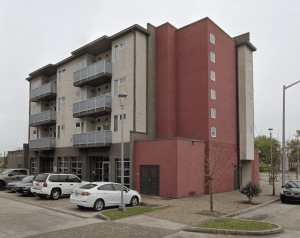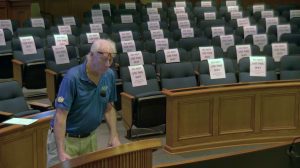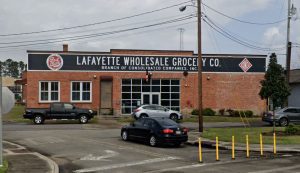Reminder: red text links to source documents.
The government is famous for sneaking things through when no one is looking. In Lafayette, for example, the local council is famous for trying to sneak new taxes past voters during festival or holiday seasons. So, when something like Coronavirus comes along, forgive me, but I have to wonder what unrelated bag of tricks is quietly working its way through local government.
The council meets despite Governor’s order
While this world-wide pandemic has been snatching all the headlines, the council met a few weeks ago (in a nearly empty chamber) to push forward with “important business.” Keep in mind that the governor had issued several orders limiting gatherings and shuttering restaurant dining rooms.
By this time, even the Louisiana Legislature had postponed all meetings until March 31st. Now, amidst the governor extending his “stay at home” order all the way to April 30th, the council is planning to violate that order by pressing forward with an April 21 meeting anyway.
At one of LCG’s recent press conferences, concerned citizens were encouraged to call 911 if they saw anyone violating the governor’s order. In such an environment, what “business” is so all-fired important that the LCG councils are compelled to meet, in violation of the same rules they expect you to follow?
Lafayette Bottle Art Lofts Funding
Perhaps some of the previous council members have realized that all of their frivolous general-fund spending was a bad idea. In the waining hours of the Robideaux administration, the council had approved $1,535,000 to renovate a piece of property that the city doesn’t even own. However, combining this with all the bureaucrat pay raises, the general fund (from which this was supposed to come) was dangerously low – perhaps even overdrawn.
Never mind that stripping that $1.5 million in “Art Lofts” funding would have been a great solution. Instead, item number seventeen on the agenda was an effort to just move some money around. Now that the council members have successfully levied a new tax for University Avenue without a vote of the people (as required by our state constitution and Article 2, section 17-D of Lafayette’s home rule charter) some $3 million sitting in the University Avenue Initiative fund can now be shifted someplace else.
What’s the University Avenue Initiative?
If you aren’t that curious, feel free to skip to the next heading. This was another of Joel Robideaux’s creations, which was funded with what would have been general fund revenue. It first appeared on page 25 of a budget amendment document at the September 8th, 2016, special budget meeting. That document dedicates a very specific $3,176,508 to the project. Just a few months ago, Nanette Cook made a motion (seconded by Bruce Conque) to add $200,000 from the general fund, by way of proceeds from the sale of the old federal courthouse building. That language appears in both the announcement and discussions of item 38 (pages 1 and 10 of the October 1, 2019, meeting’s recorded minutes). At the very next meeting, item 26 (page 5), they introduced ordinance O-199-2019 to add another $80,000 to the fund. It was approved unanimously at the next meeting on November 5th.
The initiative, and the $3,176,508, made its first budget appearance in 2016-2017, on page 314. The next year (2017-18), it appears on page 312 with $209,861 already spent. The next year (2018-19), another $124,875 was gone. Then in 2019-20, $56,268 appeared. The budget was finalized around September 5, 2019, so where that last bit of money came from (or where the rest was spent) is anyone’s guess. We could submit a public records request for all activity in that account, but by the time it filters through all the lawyers (at $250 per hour) it’ll be two weeks before we have an answer.
Can an artist loft project pay back a “loan?”
For the moment, let’s set aside the Louisiana Constitution saying all of this is illegal on its face. If you’re curious, that language can be found in Article VII, Section 14 (A). It reads: Prohibited Uses. Except as otherwise provided by this constitution, the funds, credit, property, or things of value of the state or of any political subdivision shall not be loaned, pledged, or donated to or for any person, association, or corporation, public or private.
Aside from legality, the next question any reasonable person would ask themselves before loaning money is whether or not the borrower can repay it. Considering that LCG says they’re “loaning” the Lafayette Bottle Art Lofts $1,535,000, this is an important question. However, it never came up when the motion to spend that money was introduced by Pat Lewis and seconded by Nanette Cook. It passed overwhelmingly (as usual) on December 3, 2019 (item 19 on page 6), with only William Theriot and Jared Bellard opposing.
The very generous “loan” payment terms appears at the bottom of page one, in ordinance O-216-2019, vis:
Interest Rate: Zero percent (0%) fixed rate. Variable interest rate equal to fifty percent (50%) of available cash flow net of: (a) operating expenses; (b) senior debt service (first (1st) mortgage [Chase Bank for only $600,000 – from page 2 of the loan agreement]); (c) reserves ; and ( d) annual payments to the second (2″ ) position Louisiana Housing Corporation loan equal to fifty percent (50%) of available cash flow.
Maturity: Either of forty-five (45) year term or due upon sale / refinancing.
Security: Third (3rd) lean position with mortgage sub ordinance to senior construction and permanent lenders.
Payments: Annual payments of the principal plus interest.
Did you catch that? If the project doesn’t turn a profit, they don’t have to make payments. Another point worth noting is no bank would loan you or me money for forty-five years at zero-percent interest.
To find out if this type of project would turn a profit sufficient to meet the repayment requirements of the loan, we went looking for any other “Artist Lofts” projects that already exist in Lafayette. It turns out the Studios at LWG is an exact match. Two other low-income housing properties in town that may be worth a look include JDV (Joie De Vivre, now called Uptown Lofts) and Cypress Trails Apartments. All three of these are government projects run by Lafayette Public Trust Finance Authority (LPTFA), so their financials should be available on the Legislative Auditor’s website.
Studios at LWG
Billed as a major achievement in affordable housing for artists, it was big news covered by the Daily Advertiser, the now defunct ABiz, and Developing Lafayette, among others. The enthusiasm surrounding its launch quickly subsided. Today, even its Facebook page is dead. Even though there are only 18 units, the five available annual reports betray a chronic vacancy problem.
Much as the Bottle Art Lofts name is derived from a desire to refurbish the old Coca-Coca bottling building, LWG stands for Lafayette Wholesale Grocery – the building its project refurbished. The building for Studios at LWG sits at two different addresses. 114 Oliver street, from which it takes its official business name of Studio 114, as registered with the Louisiana Legislative Auditor. The other address attributed to the same building is 333 Monroe Street, from which a scarcely used art gallery takes its name: Gallery 333.
Like the payment terms for the Bottle Art Lofts, Studio 114’s terms (as listed in their first financial statement, Note E on page 7) includes the following language:
The interest rate is a fixed rate of 0%. Commencing January 1, 2014, annual payments are required consisting of fifty percent (50%) of the net cash flow for the twelve (12) month period immediately preceding each payment.
The language is eerily similar to that of the Lafayette Bottle Art Lofts. Does this mean it also doesn’t have to be paid back? Well, according to their financial statements, not a single mortgage payment to LPTFA has been made since 2014. To see if they made any money, we put their operating revenues and expenses into a spreadsheet, separating out government grants. That “free money” included about $1 million from Louisiana Housing Corporation (the same LHC that’s the second mortgage holder on the Lafayette Bottle Art Lofts), and another $500,000 for the sale of “historic tax credits.” Charting shows the project hasn’t made any money from business operations since it opened.
Cypress Trails
Cypress Trails Limited Partnership was created by LPTFA in 2009. Although the annual reports are supposed to be published on the Legislative Auditor’s website, we can’t find them. We reached out to the legislative auditor way back in July of 2019 and received a copy of a single year: 2018. Last we heard, they’re still trying to get LPTFA’s executive director to file the correct disclosure paperwork and submit the missing annual reports.
According to the Secretary of State, since its inception in 2009, Cypress Trails has a single managing member, Anthony Daniel, chairman of the LPTFA board. No conflict of interest there. By now, the loan terms should look very familiar:
Cypress Trails Limited Partnership shall make payments to LPTFA consisting of fifty percent of the net cash flow as set forth in section 4.2 of the Partnership Agreement. The loan has a maturity date of December 30, 2025 and bears an annual interest rate of zero percent.
In the single report we’ve been able to acquire, Cypress Trails reported losses of $197,934 in 2017 and another $254,057 in 2018. Presumedly for lack of an annual “net cash flow,” there were no loan payments to either LHC (Louisiana Housing Corporation) or LPTFA for those same two years.
Uptown Lofts (Joie De Vivre)
 The Joie De Vivre project, now called Uptown Lofts, is yet another low-income housing operation created by LPTFA. If it sounds familiar, that’s probably because it was in the news recently for installing a “free” electric vehicle charging station. As with anything government related, “free” is a relative term. In short, it means it’s free to anyone who wants to charge their vehicle, but the taxpayer gets to pay the electric bill. As far as we know, no one living in this low-income housing complex has an electric vehicle.
The Joie De Vivre project, now called Uptown Lofts, is yet another low-income housing operation created by LPTFA. If it sounds familiar, that’s probably because it was in the news recently for installing a “free” electric vehicle charging station. As with anything government related, “free” is a relative term. In short, it means it’s free to anyone who wants to charge their vehicle, but the taxpayer gets to pay the electric bill. As far as we know, no one living in this low-income housing complex has an electric vehicle.
Similar to previous examples, Uptown Lofts’ annual reports betray a chronic vacancy problem. Also according to those same annual reports, the project hasn’t ever paid anything back to LPTFA or JDV Developers (which is wholly owned by LPTFA anyway).
The Partnership entered into a loan agreement with Lafayette Public Trust Financing Authority on April 8, 2011. The maximum loan amount that can be drawn is $1,000,000 at an interest rate equal to 3.00% per annum. The principal balance of this note and all accrued, but unpaid interest shall be due and payable consisting of 50% out of Net Cash Flow from the operations of the Partnership
Payment terms remain similar, but offers an interest rate of 3%, should they net enough cash flow to make payments. As of 2018’s annual report, none of the $1,000,000 from LPTFA or the $1,059,000 from JDV Developers has been paid back. In the same report, the combined, compounding interest from the two loans sits at $501,037. Adding principal and interest together means they now owe themselves $2.5 million.
The JDV Developers loan matures on December 30, 2022. At this rate they’ll have a balloon payment due of about $1.5 million – or three years worth of the business’s rental income. Remember, on average since they started in 2013, their net losses are more than $700,000 per year. These are likely the reasons all subsequent loans to themselves have been at zero-percent interest.
The chart below is just business operations. It doesn’t include government grants or their accruing annual loan interest. That $700,000 average annual loss number (above) does include the “free” money, though.
It may also be worth mentioning that at their September 24, 2019, meeting LPTFA voted to forgive $14,000 in “uncollectible rent” for Blacks Cafe. Normally, if someone can’t pay rent they get evicted, but Blacks Cafe is still there.
Past performance is not indicative of future results?
We’ve shown you three examples of existing low-income housing operations in Lafayette, all of which are losing money. These same properties have terms that don’t require loan repayment. In fact, all of these examples have failed to make regular annual loan repayments to their government “partners.” We’ve even shown that Lafayette has an existing artist loft project that can’t pay back their loans.
Even though they’re operating at an extreme loss, there’s a chronic vacancy problem in all three of these existing projects. In Lafayette’s real estate industry, vacancy is a huge supply-side problem. This is true in housing as well as the various types of other commercial real estate. As government continues to lose money while throwing more and more inventory online, the private sector simply won’t be able to compete. Before you know it, more commercial properties (the ones that are paying all of the property taxes) will become vacant. With vacancy comes lower valuations and lower tax revenue. At some point, being without sufficient revenue to keep up with maintenance expenses, the property becomes blight. And the process repeats.
###
We’re the only organization holding them accountable.
Our deep research takes a tremendous amount of time and resources. After reading this article, you can probably understand why the government isn’t funding our work. In fact, they probably wish we’d just go away. That’s why we depend on the generosity of concerned citizens like you.
We’re seeing a record number of new monthly contributors and one-time donors. These are people just like you. They’re tired of the local news constantly regurgitating government press releases, pushing higher taxes and lower expectations. Are you one of them? Join us now.










LPTFA is a monstrous perpetual motion machine- cronyism at its best. Of course, its members (who nominate and elect one another, I believe) always claim to have the city’s best interest at heart.
These so-called public trusts are a creation of the Louisiana legislature, and cannot be terminated unless they run out of $ or by legislative fiat. Since “our” Trust is in bed with municipal bond attorneys and brokers, that seems unlikely.